NCE1L73-L144重点语法练习
新概念一L1-144复习

Lesson 1-144
牛津英语内容
When is • 1.人称代词your birthday? Where is you she he 主格: I wemy ball pen? it they Why me us like her him 宾格: do you you summer?it them How many books are there in the 形容词性物主代词:my our your her his its school bag? their How old is the young man? 名词性物主代词: mine ours yours hers hisHowtheirs is the toy bear? its much How do you go to school everyday ?
Lesson 1-144
Lesson 1-144
牛津英语内容 4. 规则动词过去式
worked • 1.人称代词 work want 主格: I we you shewanted he it they 宾格: me study her him it them us you studied 形容词性物主代词:my our your her his its opened open their stayed stay 名词性物主代词: mine ours yours hers stopped stop his its theirslive lived like liked watch watched
情态动词 当句子的谓语动词是情态动词时,不论句子的主语 是什么人称和数,情态动词及情态动词之后的动 词全部用动词原形形式。 其他现象 1.当everyone等不定代词/不可数名词作主语时,谓 语要用单数形式; 2.当主语是trousers/people等复数名词时,谓语动 词使用复数形式; 3.当family/class指整体而言时,谓语动词要使用单 数形式;若是指具体的成员时,谓语动词要使用 复数形式。 4.时间/距离/数据/句子作主语时,谓语动词要使用 单数形式。
新一113-144课语法点总结

新概念英语第一册113-144课语法点总结一.so / neither引导的简短回答a.结构:1.so / neither + be动词+ 主语例:He is a dancer, so am I. 他是个舞蹈家,我也是。
2.so / neither + 情态动词+ 主语例:He can dance very well, so can I. 他跳舞跳得很好,我也是。
3.so / neither + 助动词+ 主语例:He doesn’t like singing, neither do I. 他不喜欢唱歌,我不喜欢。
b.表示某人也是,某人也会,某人也不是,某人也不会。
c.区别如果前一句是肯定的,后一句用so开头;如果前一句是否定的,后一句用neither开头。
二.not a (an) / any & no & none1.no是个限定词,用在名词前,等同于not a或not any,用来强调句子的否定含义。
例:I haven’t got any fingers. = I have got no fingers. 我没有手指。
I haven’t got a long tail. = I have got no long tail. 我没有一条长尾巴。
2.none : 没有人;一个也没有;一点儿也没有例:He has got many interesting books. I have got none.他有很多有趣的书,我一本也没有。
三.不定代词either; both; all; neither; none注意:either表示两者任选其一。
例:Which one do you want, an apple or a pear? Either is Okay.你想要苹果还是梨?都可以。
Either of my parents will come to see you. 我爸爸或者妈妈会来见你。
NCE1 L1-72复习[句型和短语]
![NCE1 L1-72复习[句型和短语]](https://img.taocdn.com/s3/m/de161e9fcc22bcd127ff0c09.png)
新概念英语第一册1—72课的句型和短语1:excuse me .打扰了,对不起。
用于与陌生人搭话,打断别人的说话或是从别人身边挤过等等。
2: sorry! 对不起。
向他人表示歉意。
Thank you/thnaks/thank you for….表感谢!please请求/礼貌3: pardon? = I beg your pardon? 请你再说一遍。
请求对方把刚才说的话再重复一遍。
4:Nice to meet you. ----------- How do you do? 很高兴见到你/你好!两个都是用在初次见面时给对方打招呼。
前者用于非正式场合,后者用于正式场地合。
5: This is + 人名这是某人向某人介绍你的朋友或是同事等等(主+系+表)介绍用语/电话用语6: What’s your job? 你是做什么工作的?= What are you? E.g. What’s your father’s job?=What’s your father?7:What nationality are you ? = where are you from? =where do you come from?8: How are you? 你好吗?这是朋友或是相识的人之间见面时向对方身体情况的寒暄话。
L67:How are you keeping? 或How are you all keeping?一般回答:Fine ,thank you 或是very well/wonderful/can’t be better/Not bad/so,so /terrible9: Whose shirt is this? 这是谁的衬衣?= Whose is this shirt?这衬衣是谁的?10: What colour is this ?这是什么颜色?11:come upstairs and see it .到楼上去看看吧。
(完整版)新概念1-144课语法和重点总结,推荐文档
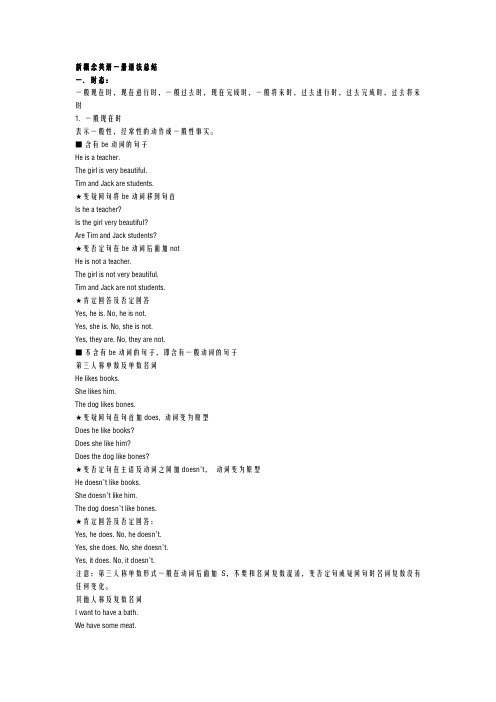
新概念英语一册语法总结一.时态:一般现在时,现在进行时,一般过去时,现在完成时,一般将来时,过去进行时,过去完成时,过去将来时1. 一般现在时表示一般性,经常性的动作或一般性事实。
■含有be动词的句子He is a teacher.The girl is very beautiful.Tim and Jack are students.★变疑问句将be动词移到句首Is he a teacher?Is the girl very beautiful?Are Tim and Jack students?★变否定句在be动词后面加notHe is not a teacher.The girl is not very beautiful.Tim and Jack are not students.★肯定回答及否定回答Yes, he is. No, he is not.Yes, she is. No, she is not.Yes, they are. No, they are not.■不含有be动词的句子,即含有一般动词的句子第三人称单数及单数名词He likes books.She likes him.The dog likes bones.★变疑问句在句首加does, 动词变为原型Does he like books?Does she like him?Does the dog like bones?★变否定句在主语及动词之间加doesn’t,动词变为原型He doesn’t like books.She doesn’t like him.The dog doesn’t like bones.★肯定回答及否定回答:Yes, he does. No, he doesn’t.Yes, she does. No, she doesn’t.Yes, it does. No, it doesn’t.注意:第三人称单数形式一般在动词后面加S,不要和名词复数混淆,变否定句或疑问句时名词复数没有任何变化。
人教版英语必修一至必修四语法知识复习与练习(详细版)

必修一至必修四语法知识复习Book 1 Unit 1-2 直接引语与间接引语直接引语到间接引语的转变注意间接引语中时态,人称,时间状语,地点状语以及其他部分要根据情况发生变化。
1.Mr Black said, “I have walked a long way this week.”Mr Black said that ___ a long way ___.A. I had walked … last weekB. he had walked … that weekC. I walked … last weekD. he has walked … this week如果引语部分是客观事实或真理,则变为间接引语,定语从句中时态不需要发生变化。
2. The teacher asked her, “Does the sun rise in the east?”The teacher asked her ___ the sun ___ in the east.A. if … riseB. if … risesC. whether … roseD. whether did … rise引语部分为一般疑问句,变为间接引语由连词whether或if引导,后面用陈述句语序3. They said to us, “Are you afraid to leave this house?”They asked us ___ afraid to leave ___ house.A. that were we … thisB. that we were … thatC. if were we … thisD. if we were … that直接引语是特殊疑问句,变成间接引语,由相应的疑问词who ,whom, whose, how, when, why, where 等引导。
句式…asked+疑问词+陈述句语序…about a week ago?”4. Jane said, “What did he hearJane asked ___ about ___.A. that he heard … a week agoB. what he had heard … a week beforeC. what he had heard … a week agoD. if he heard … a week ago直接引语是祈使句,变成间接引语,把动词原形变成动词不定式,并在动词不定前加tell, ask, order 的宾语。
新概念1-L73-L144语法重点和短语

新概念一级语法重点Part1知识点特殊句式1Can’t be表对现在的一种否定推测2Can’t have been表对过去的一种否定推测Must be表对现在的一种肯定推测Must have been表对过去的一种肯定推测3May be表对现在/正在发生的事情的一种推测May have been表对过去的事情的一种推测4.比较级er,est/more,the most5.动词不定式want,tell sb to do...6虚拟语气从句(条件句)是一般现在时-----主句一般将来时主将从现表将来If从句(一现),主句(一将)。
主句(一将)if从句(一现)。
7介词On+星期,具体日期,节日,t he bus可以站着,可以坐着的交通工具In+年,月,季节,大地点,t he morning,the afternoon,the evening,语言,颜色,服装(表示穿着什么颜色的衣服),一段时间(表将来时),the car只可以坐着的交通工具At+时间点,小地点,noon,night,lunchtime(用餐时间)Over:在……垂直上方无接触Above:在……上方,不强调垂直On:在……上面,有接触面Across:表面穿过Through:表内部穿过Under:在……正下方Below:在……下方Except:除……之外(从一个整体中除去其中一部分)Besides:除……之外(从两个整体中除去其中一个整体)In the方向(一个整体中一个在另一个的。
方向)e g.东北在中国的北方。
In方向(两个整体中一个在另一个的。
方向)e g.韩国在中国的东方。
8形容词及副词口诀:形修名,副修动副形形容词+ly=副词1,直接+ly2,以辅音+y结尾,去y变i+ly3,本身就是副词:hard,early,fast,high,long,late,very,well,…. 4,有ly但不是副词是形容词:manly,lovely,friendly….9关于“也”too放于肯定句尾也either放于否定句尾also放于句中10关于“leave”leave+地点(出发地)eg。
NCE2语法
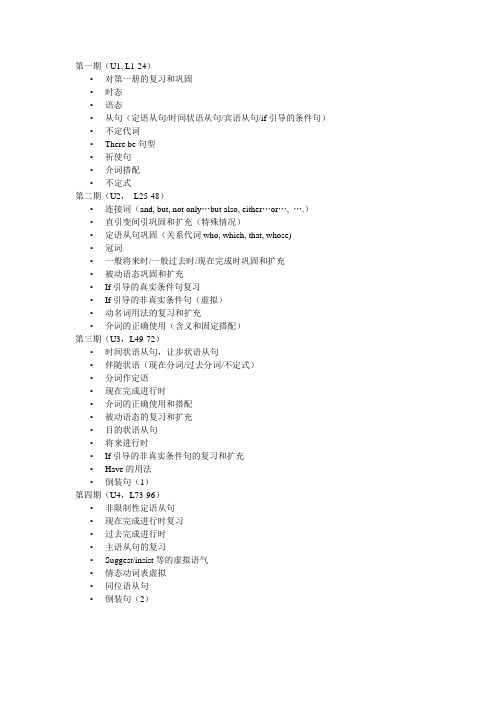
第一期(U1, L1-24)
•对第一册的复习和巩固
•时态
•语态
•从句(定语从句/时间状语从句/宾语从句/if引导的条件句)•不定代词
•There be句型
•祈使句
•介词搭配
•不定式
第二期(U2,L25-48)
•连接词(and, but, not only…but also, either…or…, ….)
•直引变间引巩固和扩充(特殊情况)
•定语从句巩固(关系代词who, which, that, whose)
•冠词
•一般将来时/一般过去时/现在完成时巩固和扩充
•被动语态巩固和扩充
•If引导的真实条件句复习
•If引导的非真实条件句(虚拟)
•动名词用法的复习和扩充
•介词的正确使用(含义和固定搭配)
第三期(U3,L49-72)
•时间状语从句,让步状语从句
•伴随状语(现在分词/过去分词/不定式)
•分词作定语
•现在完成进行时
•介词的正确使用和搭配
•被动语态的复习和扩充
•目的状语从句
•将来进行时
•If引导的非真实条件句的复习和扩充
•Have的用法
•倒装句(1)
第四期(U4,L73-96)
•非限制性定语从句
•现在完成进行时复习
•过去完成进行时
•主语从句的复习
•Suggest/insist等的虚拟语气
•情态动词表虚拟
•同位语从句
•倒装句(2)。
新概念英语第1册第73-74课重点语法

新概念英语第1册第73-74课重点语法第73-74课的内容:一、重要句型或语法1、一般过去时表示过去发生的而现在已经结束的动作或状态。
本课主要学习的是动词的过去式的不规则变化,如:went, lost, saw, said, did, spoke, put, took, found, read。
2、副词本课侧重的是“形容词+-ly”构成副词的用法,如:suddenly, pleasantly, slowly。
二、课文主要语言点Last week Mrs. Mills went to London. 1)last用来表示过去的时间,但考虑到在第75课里会重点学习过去时间的表达,建议本课点到为止。
2)went为go的过去式。
She does not know London very well, and she lost her way.1)and前后两句话用了不同的时态,能够提问学生并分析其中的原因。
2)know...very well,表熟知。
lose one's way,表迷路;注意提醒学生lose的过去式形式。
Suddenly, she saw a man near a bus stop. 1)suddenly是有“sudden(形容词,突然的)+-ly”构成的副词。
2)saw为see的过去式形式。
3)stop一般用来表示公交车站,注意对比station(火车站)和机场(airport)。
I can ask him the way,' she said to herself. 1)ask sb.the way,表示向某人问路。
2)say to oneself,表示自言自语。
said为say的过去式。
Excuse me,' she said. ' Can you tell me the way to King Street, please?' 1)关于引语中的标点符号用法:此处可提醒学生,如果在引语中插入了she said这样的提示语,前面句子的末尾一般都用逗号,除了疑问句和感叹句外。
新概念一册73-110语法汇总

it
it
its
its
他们
they
them
their
theirs
形物代变名物代:
1. 1特:my-mine2. 2原:its-its,his-his3. 4s:your-yours,her-hers,our-ours,their-theirs
2、人称代词
人称代词做主语,用主格;做宾语,用宾格
口诀:主格放句首,宾格动介后e.g:It belongs to him. ( it做主语,him做宾语)
e.g. He said that the light travels faster than the sound.
Lesson 101--104
重点:too…to , so….that , enough….to的用法
1. too,very的用法(修饰形容词,表示程度)
too表示“太…..” very表示“很”或“非常”。例:It’s too late.It’s very interesting.
④以辅音字母+y结尾的动词,先变y为i,然后再加-ed。如:study-studied;
不规则动词的过去式:
do-did eat—ate see-saw say-said run-ran speak-spoke take-took find—found read—read go-went cut—cut
1.will do结构
肯定句:主语+ will + do否定句:主语+ will not (won't) + do
e.g. He will go to America tomorrow.e.g. He won’t go to America tomorrow.
语法重点详解与练习
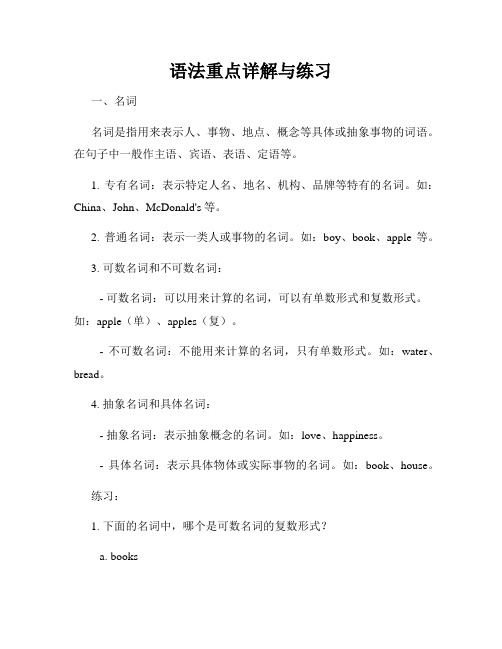
语法重点详解与练习一、名词名词是指用来表示人、事物、地点、概念等具体或抽象事物的词语。
在句子中一般作主语、宾语、表语、定语等。
1. 专有名词:表示特定人名、地名、机构、品牌等特有的名词。
如:China、John、McDonald's等。
2. 普通名词:表示一类人或事物的名词。
如:boy、book、apple等。
3. 可数名词和不可数名词:- 可数名词:可以用来计算的名词,可以有单数形式和复数形式。
如:apple(单)、apples(复)。
- 不可数名词:不能用来计算的名词,只有单数形式。
如:water、bread。
4. 抽象名词和具体名词:- 抽象名词:表示抽象概念的名词。
如:love、happiness。
- 具体名词:表示具体物体或实际事物的名词。
如:book、house。
练习:1. 下面的名词中,哪个是可数名词的复数形式?a. booksb. waterc. happiness答案:a. books2. 将下列不可数名词改写为可数名词的形式。
a. milkb. informationc. sugar答案:a. a bottle of milkb. a piece of informationc. a spoonful of sugar二、代词代词是指用来代替名词的词语。
在句子中可以作主语、宾语、定语等。
1. 人称代词:表示第一、第二、第三人称的代词。
如:I、you、he/she/it。
2. 物主代词:表示所属关系的代词。
如:my、your、his/her/its。
3. 反身代词:表示动作反身自己的代词。
如:myself、yourself、himself/herself/itself。
4. 指示代词:指示特定人或事物的代词。
如:this、that、these、those。
5. 不定代词:表示不确定或泛指的代词。
如:some、any、everyone、anyone。
练习:1. 将下列句子中的名词替换成相应的代词。
新概念英语一(72-144课)阶段性语法测试

新概念阶段性测试(100分)(宾语从句/定语从句/完成时)一、单项选择(20分)()1. Do you know ____ I could pass the exam?A. thatB. whetherC. whatD. which()2.Jim doesn’t understand ____________.A. which is the way to the museumB. why his wife always goes shoppingC. what is the way to the museumD. why does she always go shopping()3. The foreigner ______visited our school is from Canada.A. whichB. whenC. whoD. whom()4. George Mallory was an English school teacher ___ loved climbing.A. whoB. whomC. heD. which()5. ---Can I help you? ---Yes. I’d like a ticket to Mount Emei. Can you tell me ____ take to get there?A. how soon will itB. how soon it willC. how long it willD. how long will it ()6.---Could you tell me _________ the Bamboo Garden?---The day after tomorrow, I think.A.when will you visitB. when you will visitC. when would you visitD. when you would visit()7. The moon is a world ______ there is no life.A. thatB. whichC. whereD. why()8. He has forgotten the day _______ he arrived.A. whenB. whereC. thatD. which()9. It’s up to you to decide ____ you’ll go there, by air or by road.A. howB. whyC. thatD. When( )10. He asked his father _______.A. where it happensB. where did it happenC. how it happenedD. how did it happen()11. He got to the village _______ his family once lived.A. thatB. whichC. whenD. where()12. This is the house _______ I want to buy.A. in whichB. thatC. whoseD. where( )13. _______ he'll come or not isn't important(重要的).A. WhyB. IfC. WhetherD. What( )14. Would you like to know _______they will do it or not.A. ifB. thatC. whetherD. why( )15.Do you know the girl ________ is standing under the tree?A. whoB. whomC. whichD. where ( )16.Is the woman ________ talked to our teacher yesterday your mother?A. whoB. whomC. whichD. what ( )17. ─ Could you tell me ______? ─ Yes. He ____ to the USA.A. where is he/ has beenB. where he is/ has goneC. where was he/ has beenD. where he was/ has gone( )18. ─Mike wants to know if ____ a picnic(野餐) tomorrow.─Yes. But if it _______, we'll visit the museum (博物馆)instead.A. you have/ will rainB. you will have/ will rainC. you will have/ rainsD. will you have/ rains()19.I hate people _____ talk much but do little.A.whomB. whichC. whoD. when()20.I am one of the boys ________never late for school.A. that isB. who areC. who amD. who is二、改写句子(15分)1.When does the train leave?I want to know.(改为含宾语从句的复合句)I want to know _________ the train _________ .2.“Don’t be late next time ”,the teacher said to the children .(改间接引语)The teacher told the children ______ ________ ________late next time . 3.When does the train arrive? Please tell me.(改为宾语从句)→Please tell me ________ _________ ________ _________.4.Do they want ice cream ? He asked the boys. (改为宾语从句)→He asked the boys _______ _______ ______ ice cream.5.Was he absent from school ? I don't know. (改为宾语从句)→I don't know _______ _______ _______absent from school.三、用合适的连接词填空(10分)1. Wang Hai told me _________ he didn't go there yesterday afternoon.(how, why)2. Can you tell me _________ else has a pencil in our class ?(who, whom)3. She said _________she would help me tomorrow.(that, if)4. He always thinks _________ he can do better.(how, who)5. I really don't know _________ the bridge will be finished.(how long, how soon)6. They don't know _________ we will go to the party tomorrow. (what,how)7. She wanted to know _________ her mother was tired or not. (whether,why)8. Do you remember _________the teacher told us just now? (how,what)9. I don't know _________so many people went to see him yesterday.(why,where)10. Do you know _________ shirt it is?(what,whose)四、填入恰当的关系代词或关系副词。
新概念英语第一册语法及专项练习
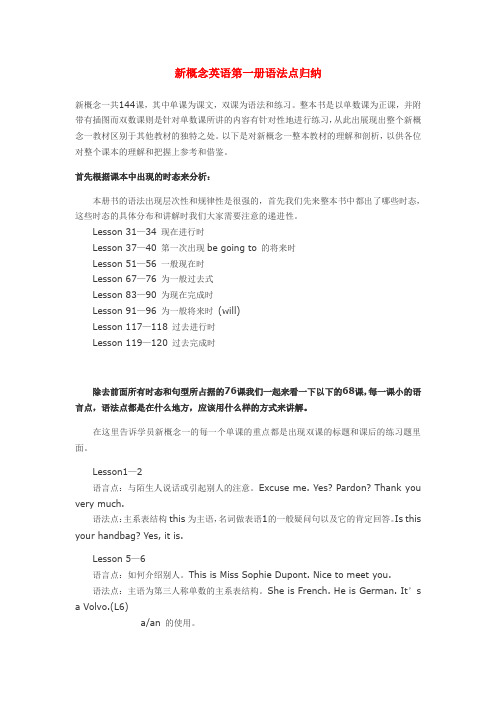
新概念英语第一册语法点归纳新概念一共144课,其中单课为课文,双课为语法和练习。
整本书是以单数课为正课,并附带有插图而双数课则是针对单数课所讲的内容有针对性地进行练习,从此出展现出整个新概念一教材区别于其他教材的独特之处。
以下是对新概念一整本教材的理解和剖析,以供各位对整个课本的理解和把握上参考和借鉴。
首先根据课本中出现的时态来分析:本册书的语法出现层次性和规律性是很强的,首先我们先来整本书中都出了哪些时态,这些时态的具体分布和讲解时我们大家需要注意的递进性。
Lesson 31—34 现在进行时Lesson 37—40 第一次出现be going to 的将来时Lesson 51—56 一般现在时Lesson 67—76 为一般过去式Lesson 83—90 为现在完成时Lesson 91—96 为一般将来时(will)Lesson 117—118 过去进行时Lesson 119—120 过去完成时除去前面所有时态和句型所占据的76课我们一起来看一下以下的68课,每一课小的语言点,语法点都是在什么地方,应该用什么样的方式来讲解。
在这里告诉学员新概念一的每一个单课的重点都是出现双课的标题和课后的练习题里面。
Lesson1—2语言点:与陌生人说话或引起别人的注意。
Excuse me. Yes? Pardon? Thank you very much.语法点:主系表结构this为主语,名词做表语1的一般疑问句以及它的肯定回答。
Is this your handbag? Yes, it is.Lesson 5—6语言点:如何介绍别人。
This is Miss Sophie Dupont. Nice to meet you.语法点:主语为第三人称单数的主系表结构。
She is French. He is German. It’s a Volvo.(L6)a/an 的使用。
Lesson 7—8语言点:如何自我介绍和相互认识。
NCE1.语法总结及练习
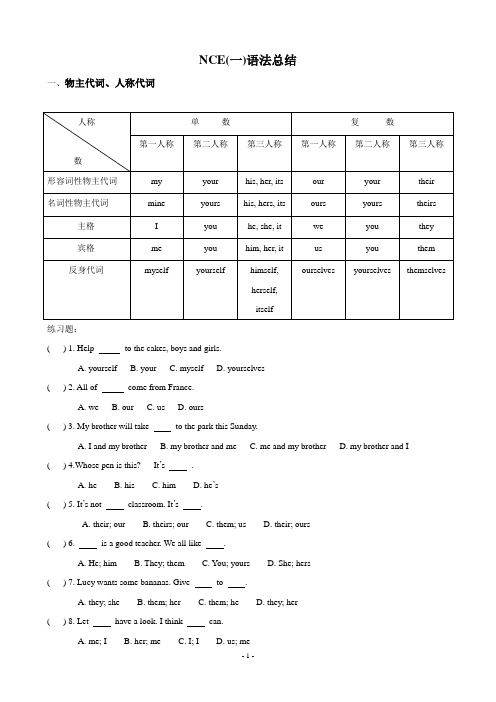
NCE(一)语法总结一、物主代词、人称代词练习题:( ) 1. Help to the cakes, boys and girls.A. yourselfB. yourC. myselfD. yourselves( ) 2. All of come from France.A. weB. ourC. usD. ours( ) 3. My brother will take to the park this Sunday.A. I and my brotherB. my brother and meC. me and my brotherD. my brother and I ( ) 4.Whose pen is this? It’s .A. heB. hisC. himD. he’s( ) 5. It’s not classroom. It’s .A. their; ourB. theirs; ourC. them; usD. their; ours( ) 6. is a good teacher. We all like .A. He; himB. They; themC. You; yoursD. She; hers( ) 7. Lucy wants some bananas. Give to .A. they; sheB. them; herC. them; heD. they; her( ) 8. Let have a look. I think can.A. me; IB. her; meC. I; ID. us; me二、祈使句表示请求、要求、命令、建议等方面意义的句子称为祈使句。
祈使句以动词原形开头,省略主语you。
祈使句的否定形式是在动词原形前加don’t.Come in!→Don’t come in! Stop talking!→Don’t stop talking.Let her in!→Don’t let her in! Open the door, please!→Don’t open the door!练习题:用括号内所给动词的正确形式填空。
新概念英语第一册111-144课语法复习
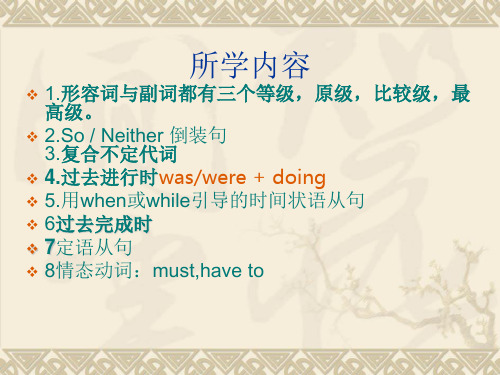
So / Neither 倒装句
1. -- I won’t do such a thing. –Neither / Nor will I. 2. If you won’t go, neither shall I. 3. -- I haven’t done my homework. –Neither / Nor have I. 4.I didn’t read the notice on the bulletin board, nor did he. 由neither或nor引起的,表示前面所说的情 况 也适用于另一个人(或物)的句子
所学内容
1.形容词与副词都有三个等级,原级,比较级,最 高级。 2.So / Neither 倒装句 3.复合不定代词 4.过去进行时was/were + doing 5.用when或while引导的时间状语从句 6过去完成时 7定语从句 8情态动词:must,have to
Grammars
定义:在复合句中修饰名词和代词的从句叫做定语从句。 被定语从句修饰的名词或代词是先行词。定语从句必须 放在先行词之后。
定语从句要由关联词:关系代词who,
whom, that,which或关系副词when, where等引导。
The student who answered the question was peter. 回答问题的那个学生叫Peter.
正在进行的情况进行 2. 情态动词+be doing,表对:_______________ 推测。
例:He
Байду номын сангаас
must be having a lot of money. 他一定有很多钱。 他们一定正在睡觉吧。 They must be sleeping. Jim may be playing the basketball. 吉姆可能正在打篮球。
NCE-1重点语法习题1

NCE-1Test Paper English Name_________ Chinese Name________ Mark________ 一将下列句子改成被动语态:1.Mr. Black invited us to dinner this night.2.The boy broke the vase.3.We sweep the floor every day.4.The man painted the wall blue.5.Someone met us at the airport.二将下列句子改成间接引语:1.I may not go to work tomorrow.-What did he say?2.I’m very hungry.-What did the boy say?3.I’m going to get married.-What did she tell you?4.The sun rises in the east and sets in the west.-What did the teacher tell you.三用所给词的正确形式填空:1.Hello, this is Tom ________(speak).2.If you _(want) to catch the first bus, you ___________(get) up early.3. Haven’t I _________(tell) you not _________(play) with matches?4. -Why _______he _________(come) yesterday? -He must _________(be) busy.5. -Do you know what he ________(do)? -He is working in the garden.6. The little girl had never _________(travel) on a train before7.This room _______(clean) yesterday.8.The table _________(cover) with books.9.-________you just _________(finish)your homework?-Yes, I have.10.I didn’t see him yesterday. He ___________(must be) ill.11.-How are you feeling now?-I’m feeling very ___________(tire).12.Let me___________(introuce)my friend to you.13.He said that he ____________(can)help me with my work.14.The old man __________(retire) two years ago.15.He ___________(live) here since he was young.16.Today is his __________(six) birthday.17.Look! That man ____________(wave) to you. Do you know him?18. The children were playing in the garden. They _____________(must finish) their homework.19. We have no time. You _____________(have)better hurry up.20. We make up our minds _______________(go)to the country for our holiday.21.Bob ____________(go) to school yesterday, because he was ill.22.The girl who we ____________(see) just now is my classmate.23.By the end of last week, I ____________(read)three books.24.Must I ______________(finish)my homework first?25.When we __________(arrive) the station, the train ____________(leave).26.–What _____your mother ________(do) when I telephoned last night? ---She_______(cook) in the kitchen.27.–When will you finish your work? ---I _______ (finish) it the day before yesterday.28.The teacher ________(say) that he ___________(take) us to the park next week.29.Let’s _______(go) there and have a look.30.Someone knocked at the door while I ___________(read) in the room.31.---When did he telephone you? --- He __________me an hour age.32.The woman went to the grocer’s after she _________(finishz0 the housework.33.He _______(buy) a new car yesterday, because he ____________(sell) his old one.34.Would you please __________(give) me a cup of tea?35.He runs much ________(fast) than I.36.----_________ he ____________(finish) his homework? ---No, he hasn’t. He ________(read) a book now.37.There are three pictures on the wall. The one on the left is ______________(beautiful).38.Jack is _________(tall) in his class.39.---How about your maths exam? ---- I think I’ve _________(get) a high mark.40.He sat there and _______(read) a book carefully.41.He _________(read) English now. He often __________(read) it at this time every day.42.---When ________he _____(go) to Japan? ---- In two days.43.I’m afraid this is too ______(large) for me.44.I _______(leave) my bag on the table in the office last night.45._______ this box of chalk _______(belong ) to you?46.---Have you ________*(be) to that village? --- Yes, I have. I _______(go ) there last Sunday.47.I have _____(see) this film for three times.48.We are trying ________(repair) this machine.49.He must ________(go) to work on Sunday.50.You can ________(do) your homework at 6:00.四.Fill in the blanks.1. ---What’s the m_________ with Jim? ---He’s tired.2. Do you r________ his telephone number?3. Bill was a_________ from school yesterday.4. I’m going to the b_______ to buy some meat.5. He a ________ home at ten o’clock last night.6. Can you tell me the w______ to the hospital?7. He took a glass of water and d________ it quickly.8. I want to buy a p________of shoes.9. She is w__________ the plates in the kitchen.10. They work very h_______.11.I can’t buy this coat. I don’t have any m________.12. Can you s_____ English?13. There are h________of students in our school.14. I went to the h_______’s to have my hair cut yesterday.15. His parents live in the t_______.五.Choose the best answer.1. _______ you at the baker’s yesterday? A. Did B. Do C. Are D. Were2. He often _____ to the butcher’s, but he didn’t _______ yesterday. A. go/go B. goes/goes C. go/goes D. goes/go3. ---We are going to the park. ---- Enjoy _________. A. you B. yourself C. yourselves D. yourselfs4. _____ play with matches! A. Not B. Don’t C. Do D. Doesn’t5. This is good news ______us. A. for B. to C. is D.are6. He ____ a bad cold. We must call a doctor.7. ---When ________me three times last night? --- I arrived home at six.A. did you arrivedB. did you arriveC. do you arriveD. do you arrived8. Please give me _____. A. a glass of waters B. glass of waters C. a glass of water D. glass of water9. We’re going to the park. Do you want _____us? A. to go with B. to go together C. go with D. go together10. There is ____ water in the bottle. A. many B. much C. a lot D. lot of11. My watch doesn’t work. I want __ it. A. repair B. repair C. repaired D. to repair12.When are you going to bring your ____us? A. for B. to C. with D. on13. I bought this pair of trousers two days ___. A. before B. after C. ago D. behind14. Let’s go and ___ the car. A. have a look B. have look C. have a look at D. have look at15. He has been to Shanghai several times _____1990. A. at B. for C. since D. in。
- 1、下载文档前请自行甄别文档内容的完整性,平台不提供额外的编辑、内容补充、找答案等附加服务。
- 2、"仅部分预览"的文档,不可在线预览部分如存在完整性等问题,可反馈申请退款(可完整预览的文档不适用该条件!)。
- 3、如文档侵犯您的权益,请联系客服反馈,我们会尽快为您处理(人工客服工作时间:9:00-18:30)。
现在完成时1、 Miss Green isn't in the office . she_______ to the library .A.has gone B. went C.will go D. has been2、My parents ______ Shandong for ten years .A. have been in B. have been toC. have gone to D. have been3、 has Mr White been a member of Greener China since he to China?A. How soon, comesB. How often, gotC. How long, cameD. How far, arrived4、 His uncle for more than 9 years.A. has come hereB. has started to workC. has lived thereD. has left the university5、 You have _____ a tall young man.A grownB grown intoC grown usD grown up6、 He has ____ the watch for a year.A buyB boughtC haveD had7、 I'm sorry, I ____ your name.A had forgottenB forgotC have forgottenD forgotten宾语从句用所给动词的适当形式填空。
1)I know that the young man ______________(come) to the village every Saturday.2). We have learnt that the earth ________________(go) around the sun..3) He was afraid that he ______________________(forget) his Chinese.4)I am sure that she ________________(like ) this book.5)He told me that he ________________(tell) a story when I came in .2.用适当的连接词填空。
1) The mother likes saying __________________she has a good daughter.2) They told me __________________ they could finish the work before ten o’clock.3) The boy wanted to know _______________(是否)they could go boating.4) Mr Green asked ______________would give the message to Miss Wang.5) Dad wanted to know ______________the tennis match would be.一般将来时单项选择。
( ) 1. There __________ a meeting tomorrow afternoon.A. will be going toB. will going to beC. is going to beD. will go to be( ) 2. Charlie ________ here next month.A. isn’t workingB. doesn’t workingC. isn’t going to workingD. won’t work( ) 3. He ________ very busy this week, he ________ free next week.A. will be; isB. is; isC. will be; will beD. is; will be( ) 4. There ________ a dolphin show in the zoo tomorrow evening.A. wasB. is going to haveC. will haveD. is going to be( ) 5. Mother ________ me a nice present on my next birthday.A. will givesB. will giveC. givesD. give反义疑问句练习1. Linda ate nothing this morning, ___?A. didn’t sheB. was sheC. did sheD. wasn’t she2. There’s hardly___ milk in the bottle, _____there?A. no, isn’tB. some, isC. little, isn’tD. any, is3. He has never ridden a horse before, ___?A. does heB. has heC. hasn’t heD. doesn’t he4. — He seldom came here, _____? — Yes sir.A. didn’t heB. does heC. doesn’t heD. did he5. Everything seems all right, _____ ?A. does itB. don’t theyC. won’t itD. doesn’t it比较级与最高级用所给词的正确形式填空:1. Of the two girls, I find Lucy the _______ (clever).2. Gold(黄金) is ______ (little) useful than iron(铁).3. My sister is two years _______ (old ) than I.4. John’s parents have four daughters, and she is the _____ (young) child.5. The _____ (cheap) bags are the not usually the best ones.6. The short one is by far _______ expensive of the five.7. The boy is not so ______ (interesting) as his brother.8. Dick sings _____ (well), she sings ______(well) than John, but Mary sings______(well) in her class.9. She will be much ______ (happy) in her mew house.10. This dress is ______ that.(twice, as…as…, expensive)Neither/so表示“也是”、“也不是”1. I can play football. (我也会)2. He isn’t a teacher. (她也不是)3. They are watching TV. (我们也是)过去进行时1.He said he _____ to draw a plane on the blackboard at that time.a. triesb. triedc. was tryingd. will try2.They _____ a football game from 7 to 9 last night.a. were watchingb. watchc. watchedd. are watching3.It was Friday evening. Mr and Mrs. Green _____ ready to fly to England.a. are gettingb. getc. were gettingd. got4.We ____ for tom at ten last Sunday. He often kept us ______.a. were waiting, waitingb. were waiting, waitc. waited, waitingd. waited, wait5.He ____ his father on the farm the whole afternoon last Saturday.a. helpsb. would helpc. was helpingd. is helping6.This time yesterday jack _____ his bike. He _____ TVa. repaired, didn't watchb. was repairing, watchedc. repaired, watchedd. was repairing, wasn't watching过去完成时( )(1)By the end of this century, we__ ours into a strong modern country.A. will buildB. had builtC. have builtD. will have built( )(2)We _________the work by six yesterday evening.A. finishedB.would finishC. had finishedD. had been finished( )(3)I _________to help you but couldn’t get here in time.A. wantB. had wantedC. have wantedD. was wanting ( )(4) Mrs. Wu told me that her sister___________.A. left about two hours beforeB. would leave about two hours beforeC. has left about two hours agoD. had left about two hours before( ) (5)When I reached home, my parents __________their supper.A.are havingB.have already hadC.have hadD. had already had( ) (6)Did you see Xiao Li at the party? No, ______by the time I arrived.A.she’d leftB.she's leftC. She was leftD.she must leaveWhen与While的时间状语从句用when或while填空1. _____ the teacher came in, we were talking. _____ we were talking, the teacher came in.2. He was driving along ____ suddenly a woman appeared.3. ____ Jack was waiting at the door, an old woman called to him.4. He was reading a book ____ suddenly the telephone rang.5. ____ it began to rain, they were playing chess.6. She saw a taxi coming ____ the woman was waiting under the streetlight.7. While Jack _________(look) for customers, he _______(see) an old man.8. John __________(sleep) when someone_____(steal) his car.9. He is strong_____ his brother is weak.10. The children were running to move the bag of rice ______ they heard the sound of a motorbike.定语从句1. This is the man ________ wants to see you.2. The student ___________ answered the question is Zhang Hua.3. The man __________ you went to see has come.4. The runner ________________ you are asking about is over there.5. Show me the boy ______________ mother is a well-known singer.6. Is there anyone ____________ family is in Beijing?if引导的条件状语从句1. If he____________ (not, do it), I___________(do) it.2. If you ____ (be) late for school, my teacher ________(be) angry.3 If she________ (win) the prize, we _______(be) happy.4. If I _________ (not, eat ) so much ,I _________(get) thinner.5. If you ______(tell) them, they _____________ (not,believe) you.6. I _________(stay) at home, If it __________( rain).7. If it ____________(not, rain) ,I _________( go) out.8. we __________(play) football, If it is _________(sun) .9. If she __________(become) a star, her parents ____________ (not, send) her away10. He _________(watch) TV ,if he ______(be) free.被动语态( ) 1 The People's Republic of China ___ on October 1, 1949.A. foundB. was foundedC. is foundedD. was found( ) 2 English ____ in Canada.A. speaksB. are spokenC. is speakingD. is spoken( ) 3. This English song___ by the girls after class.A. often singsB. often sangC. is often sangD. is often sung( ) 4. This kind of car ___ in Japan.A, makes B. made C. is making D. is made( ) 5. New computers ___ all over the world.A. is usedB. are usingC. are usedD. have used( ) 6. Our room must ___ clean.A. keepB. be keptC. to be keptD. to keep( ) 7. The play ___ at the theatre next Sunday.A. is going to be shownB. will shownC. will showD. is shown( ) 8. The old stone bridge ___ next week.A. is going to be rebuiltB. will be rebuildC. are going to be rebuiltD. will rebuild。
